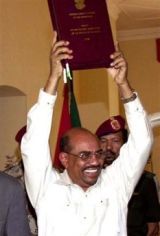Sudan parliament starts debating proposed constitution
KHARTOUM, Sudan, June 27, 2005 (AP) — Sudanese lawmakers Monday began debating a proposed constitution that represents a significant step away from Islamic rule in a country emerging from war between the mainly Muslim north and the non-Muslim south.

|
|
The draft interim constitution for Sudan is held aloft by Sudanese President Omar Al Bashir, in Khartoum, Sudan, on Sunday, June 26, 2005. (AP). |
The proposed constitution says Islamic law won’t be applied in the mainly Christian and animist south and removes a requirement that the president be Muslim.
Debate is expected to take a week. A vote was expected shortly before a government of national unity takes office July 9, with Omar el-Bashir continuing as president and vice presidents Ali Osman Mohammed Taha, the lead negotiator in peace talks with the southern rebels, and former rebel John Garang.
Lawmakers are expected to adopt the constitution unanimously, as they did the peace deal struck in January that ended a two-decade war between government troops and Garang’s forces.
The constitution, like the peace deal that paved its way, has been cause for hope. When it was presented to el-Bashir at a ceremony Sunday, cheers of “God is Great” and “Hallelujah” broke out and a band played a fanfare on trumpets and clarinets.
“This is a message we send to the whole world from the Sudanese people: This is a tolerant people,” el-Bashir said Sunday. “We are a people who can overcome all suffering and, sitting together face-to-face, we can forget all our suffering.”
Mahjoub Mohamed Salih, the 75-year-old editor of the oldest independent newspaper now in circulation, al-Ayam, wrote Monday that profound change was ahead for Sudan, starting with the July 9 convening of the unity government.
“There should be changes in the life of people, the situation should be normalized and the doors should be wide open for political activities, and all restrictions should be lifted and there should as well be freedom of expression and of organizations,” he wrote. “This is the really beginning of a democratic change in the country.”
Ismail Hajj Mussa, who heads parliament’s legal and constitutional committee, said the current constitution, adopted in 1998, was the work of the ruling party and the peace agreement the work of the ruling party and the rebels. The proposed constitution, though, was the work of “a host” of groups, ironed out during more than 300 hours of meetings and discussions held around Sudan.
“This is why it is well received,” Mussa said Monday.
“I believe this is a qualitative development in the constitutional life” of Sudan, he added.
The draft constitution said Islamic law would be the source of legislation applied in the northern states, while in the south local customs and traditions and respect for the country’s diversity would inform laws.
The president need no longer be Muslim, but must be Sudanese, at least 40 years old, literate and free of a criminal record.
It is the first Sudanese charter to lay out freedoms of religion and expression as human rights. In another first, women as well as men would be able to pass on Sudanese nationality to their children.
